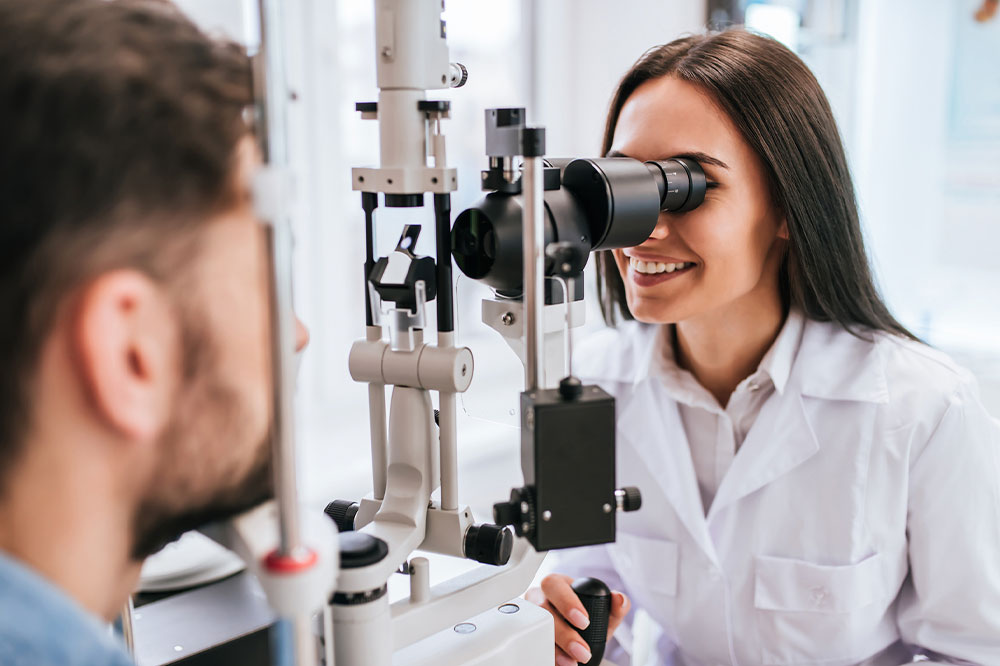Understanding the Different Eye Care Specialists
Have an eye problem? Confused about which eye professionals to consult? Well, every eye doctor, an ophthalmologist, an optometrist, or an optician, specializes in different eye-related problems. Each eye care expert possesses different levels of expertise and training to generate high-quality and varied eye services. Consult the one that can provide the best ophthalmic solutions. In some cases, these professionals work as a team to provide the best option to treat an eye problem.

Let’s explore how the three experts differ from each other.
Ophthalmologist
They are usually experts in surgical eye care. After completing medical school, they have a one-year internship along with a three-year residency at a hospital. Sometimes, this is followed by one to two years of fellowship. They provide complete services for eye care, which are:
- Eye examination and vision services
- Eye care for several conditions such as chemical burns, iritis, and glaucoma
- Surgical eye care for crossed eyes, trauma, and other issues
- Diagnosis and treatment of specific eye conditions related to diseases such as arthritis and diabetes
- Plastic surgery to smooth out wrinkles or raise droopy eyelids
If you are looking for the “best children’s eye doctors near me,” you can consult a pediatric ophthalmologist for solutions. The eye conditions or issues treated by a pediatric specialist include:
- Uncorrected refractive errors
- Misalignment of the eyes
- Vision differences in both the eyes
When can one consult a pediatric ophthalmologist for children?
Eye abnormalities or undiagnosed eye issues can trigger poor vision or permanent damage to the eye. Pediatric ophthalmologists recommend a comprehensive eye screening for children at age 1.
Early diagnosis helps in efficient recovery of the eye with good vision. Pediatric ophthalmologists also diagnose and rectify eye issues in new-born such as neonatal conjunctivitis, cataract, an eye tumor, and retinopathy of prematurity. If the eye issues are left untreated for the first six months of the baby’s birth, there is a high chance that the baby will remain visually impaired for the rest of their life.
Optometrist
Optometrists provide vision as well as eye care services. They are responsible for taking primary care of the eye. They are enrolled in a professional program to get certification in optometry. In some cases, optometrists complete additional clinical training. Their prime responsibilities include:
- Performing vision and eye examinations
- Prescribing contact lenses or eyeglasses
- Examining eye diseases related to diabetes
- Managing and testing glaucoma and dry eyes
- Offering low-vision therapy
Optician
They are specialists in providing contact lenses or eyeglasses. Opticians are not eye doctors; hence, they cannot perform eye examinations. They get a degree, diploma, or certificate to practice as an optician in eye clinics or hospitals. Their responsibilities include:
- Filling the prescription provided by ophthalmologists
- Checking lens prescriptions
- Providing contact lenses or eyeglasses
- Ordering and checking products such as eyeglasses or contact lenses
Who is a cornea specialist?
A cornea specialist is one of the subspecialists of ophthalmologists. They help patients in coping with diseases that impair the cornea, the transparent layer that protects the front part of the eye. These specialists are experts in refractive surgery such as LASIK and corneal transplants. Confused about where to find the best doctors for LASIK eye surgery? You need to know the basics of LASIK.
What is LASIK?
Laser-Assisted In-Site Keratomileusis or LASIK is an option for correcting eye power. The first laser surgery was performed during the 1980s in Germany. Since then, LASIK has witnessed several major advancements, which have enhanced the surgery quality in terms of precision and safety. It is also used for retinal and cataract treatments.
What are the conditions you need to know before receiving LASIK?
First, you need to visit your ophthalmologist for a thorough eye check-up. The primary examination will include an analysis of the thickness and shape of the cornea, pupil, and refractive errors such as myopia, hyperopia, astigmatism, and other eye conditions.
Second, the ophthalmologists will check the moisture levels. Based on this, the doctor will recommend certain precautionary treatments to decrease the risk of developing dry eyes after surgery.
Who is an ideal candidate for LASIK?
To receive LASIK, the candidate must:
- Be at least 18 years of age
- Lack an autoimmune disease which may create complications after the surgery
- Not being breastfeeding or pregnant as increased hormone levels during pregnancy can impact the eye’s shape.
- Have healthy eyes with no history of a chronic dry eye condition, cataracts, or glaucoma
How to select the best eye doctors?
If you are looking for the best eye doctor for your optic problem, you might get confused due to their qualifications, skills, or experiences. If it is your first time, ask your friends or family for recommendations. You can simply look for the “best eye doctors” on the Internet for options. Make sure you take a look at the doctor’s qualifications and patient reviews. Also, you can check for best doctors in the world if your case is critical.




